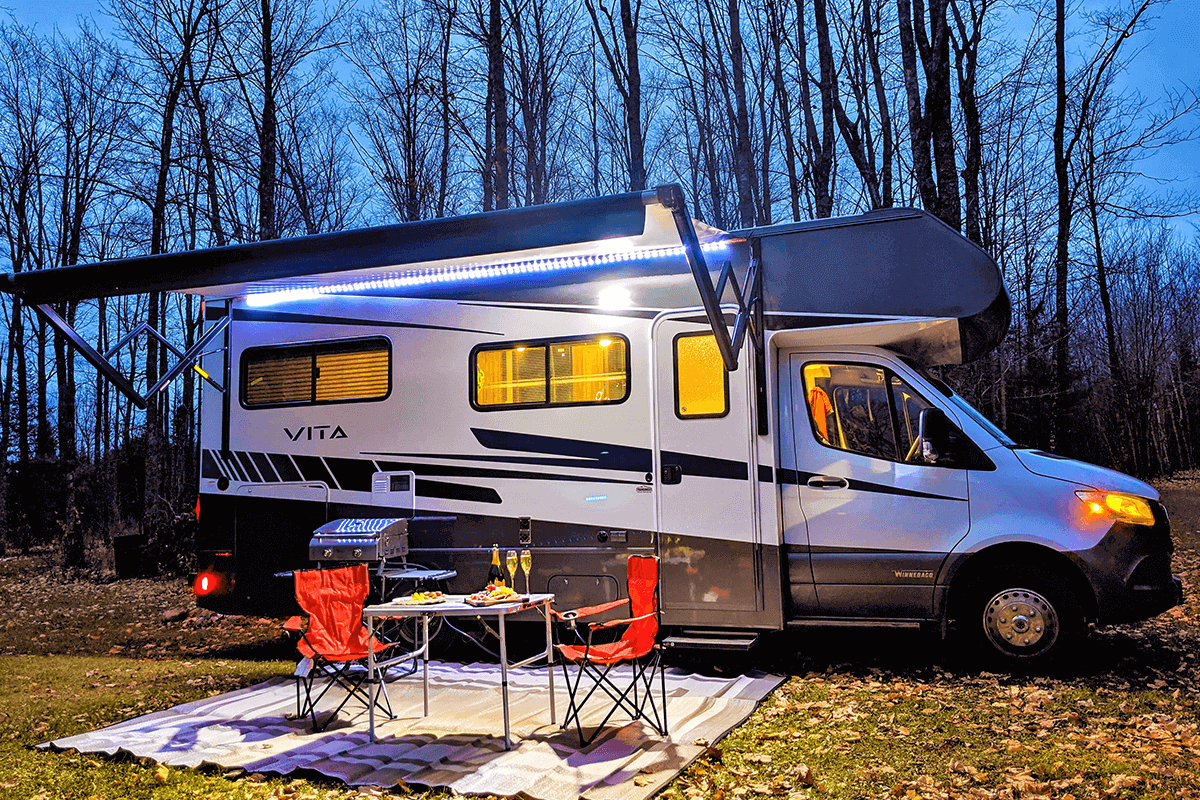Are you dreaming of an unforgettable road trip adventure and contemplating renting an RV? Well, you’re in for an exhilarating journey Yet, selecting the ideal RV can be quite the puzzle with a plethora of choices. But fret not; we’re here to guide you in making the perfect RV rental choice that aligns with your needs. In this comprehensive guide, we’ll navigate you through the diverse world of RVs, unveil budget-friendly strategies, unveil destination gems, and provide tailored advice for varying group sizes. So, let’s embark on this road trip planning odyssey.
Get to Know the Different Types of RVs
RVs come in all shapes and sizes, each with its own unique set of advantages and disadvantages. Let’s explore the primary types of RVs you can rent:
Class A motorhomes: These are the grandiose giants of the RV world. Class A motorhomes are spacious, offering full kitchens, bathrooms, bedrooms, and plenty of room for large groups, often accommodating up to 10 people. They’re equipped with residential appliances, upgraded furniture, and ample storage. However, they tend to be the most expensive to rent and operate, and their size can make them challenging to drive and park.
Class B Motorhomes (Camper Vans): Also known as camper vans or conversion vans, Class B motorhomes are the smallest and most maneuverable of the RVs. They can fit into standard parking spaces and are easy to drive. These RVs feature flexible living and sleeping spaces, a small kitchen, and sometimes a toilet and shower. Class B motorhomes can comfortably sleep up to four people and are ideal for boondocking (camping without hookups). Keep in mind that they offer limited storage and amenities and may feel a bit cramped for some travelers.
Class C Motorhomes: Positioned between Class A and Class B, Class C motorhomes are built on a van chassis with a cab-over bunk. They have a separate living area, kitchen, bathroom, and bedroom. These RVs can sleep up to eight people and offer more amenities than Class B motorhomes. While they’re not as spacious and luxurious as Class A motorhomes, they can be easier to handle in some driving situations.
Travel Trailers: These are towable RVs that attach to a bumper or frame hitch. Travel trailers come in various sizes and styles, from tiny teardrops to large fifth wheels. They feature a living area, kitchen, bathroom, and bedroom and can accommodate up to 10 people. The advantage of travel trailers is the flexibility they provide. However, you’ll need a suitable tow vehicle and some driving skills to maneuver them effectively.
Pop-Up Campers: Pop-up campers are also towable RVs but are known for their compact size when in transit. These RVs have canvas walls that pop up to create a living area, kitchenette, and sleeping space. They can comfortably sleep up to six people and are lightweight and affordable. Keep in mind that pop-up campers have limited amenities and insulation, and setting up and taking them down can be a bit time-consuming.
Truck Campers: These RVs are designed to fit in the bed of a pickup truck. They feature a living area, kitchenette, bathroom, and sleeping space over the cab. Truck campers can accommodate up to four people and are ideal for off-road adventures. However, they come with very limited space and amenities and require a compatible truck.
Consider Your Budget
Renting an RV can be a fantastic way to explore new places, but it’s essential to plan your budget wisely. Let’s break down the various costs associated with renting an RV:
Rental Fee: This is the amount you’ll pay to the RV owner or rental company for using their RV. The rental fee depends on factors like the RV’s type, size, age, condition, and popularity. Season, trip duration, and location also impact the cost. You can easily compare prices for different RVs using online platforms like RV Share or Outdoorsy.
Deposit: To secure your reservation and cover potential damages or losses during your trip, you’ll need to pay a deposit. Typically, this deposit is refundable if you return the RV in good condition and adhere to the rental agreement terms.
Insurance: RV rental insurance is mandatory and necessary to protect you from liability in the event of an accident or damage involving the RV. Insurance can be provided by the owner or the rental company (usually for an extra fee), or you can use your auto insurance policy if it covers RV rentals.
Mileage: You’ll pay for the miles you drive the RV during your trip. Some owners or rental companies offer unlimited mileage or include a certain number of miles per day in the rental fee, while others charge a per-mile fee once you exceed a limit.
Gas: The cost of fueling the RV during your journey depends on gas prices in your area, the RV’s gas mileage (which varies by type), and the distance you travel.
Generator: If you need to power appliances and devices when not plugged into an electrical hookup, you’ll pay for using the RV’s generator. Some owners or rental companies include a certain number of generator hours per day in the rental fee, while others charge a per-hour fee after exceeding a limit.
Propane: To run the furnace, water heater, stove, oven, and refrigerator when not plugged into an electrical hookup, you’ll need propane. Some owners or rental companies include a full tank of propane in the rental fee, while others charge a per-gallon fee for refilling the tank.
Dumping: Emptying the RV’s black and gray water tanks at a dump station may incur a fee. Some owners or rental companies include dumping in the rental fee, while others charge a fee if you return the RV without taking care of this task.
Cleaning: After your trip, you may need to pay for cleaning the RV. Some owners or rental companies include cleaning in the rental fee, while others charge a fee if you return the RV without meeting their cleaning standards.
Campground Fees: Staying at a campground or RV park during your journey will involve additional costs. Campground fees vary depending on the location, amenities, campground size, and type of RV. You can find and book campgrounds or RV parks online using platforms like Compendium or The Dyrt.
Choose Your Destination
One of the joys of RV travel is the flexibility to explore numerous destinations. Your choice of destination can greatly influence your overall experience. Here are some factors to consider when selecting your RV trip destination:
Distance: Think about how far you want to travel from your home base. The distance will affect your gas costs, mileage fees, travel time, and the wear and tear on the RV. If you have a limited budget or time frame or feel uncomfortable driving long distances in an RV, consider a closer destination.
Terrain: Consider the type of roads and landscapes you want to explore. The terrain can affect your driving skills, gas mileage, and safety. If you have a large or heavy RV or lack experience driving on steep or rough roads, opt for flat and paved destinations. For small, light RVs and adventurous travelers confident in tackling challenging roads, hilly or off-road destinations can be exciting choices.
Climate: The climate of your destination will impact your comfort, insulation, and energy consumption within the RV. If you have a pop-up camper or a truck camper and want to engage in outdoor
Activities and warm and sunny destinations might be preferable. On the other hand, if you’re traveling in a Class A motorhome or a fifth-wheel trailer and wish to experience winter sports, consider cold and snowy destinations.
Attractions: Think about the kinds of activities and sights you want to explore. The attractions available at your destination will influence your campground fees, parking availability, and entertainment options. If you have a self-contained RV that’s boon docking-friendly or you’re eager to enjoy nature and wildlife, choose a destination with natural attractions like national parks, lakes, mountains, or beaches. On the other hand, if your RV requires hookups and amenities or you’re looking for an urban and social experience, opt for destinations with cultural attractions such as museums, festivals, restaurants, or shopping malls.

Consider Your Group Size
The number of people traveling with you is an essential factor to consider when renting an RV. Your group size will influence the level of comfort, space, and budget required for your journey. Here are some tips on accommodating different group sizes:
Couples: Traveling with your partner? Consider renting a Class B motorhome, a truck camper, or a small travel trailer. These options provide a cozy and romantic atmosphere with enough space and amenities for two people. They are flexible and versatile for different destinations.
Families: For family adventures, Class C motorhomes or larger travel trailers could be suitable. Class C motorhomes often accommodate up to eight people, providing a more spacious and comfortable experience for families. Larger travel trailers can also be a good choice, accommodating varying group sizes.
Large Groups: If you’re traveling with a significant number of people, you might need to rent a Class A motorhome, a larger travel trailer, or multiple smaller RVs. These options offer the space and amenities needed for larger groups. Keep in mind that Class A motorhomes are typically more luxurious but come at a higher cost.
Tucson Mobile RV Service is your ultimate destination for getting your RV primed and ready for your next adventure. Our unwavering commitment to optimizing your RV’s performance and ensuring its impeccable maintenance sets us apart. With a focus on delivering top-notch services, we offer competitive pricing that doesn’t compromise on quality. Whether it’s a tune-up, repairs, or routine maintenance, our team is here to make sure your RV is in its best shape, ensuring a worry-free and enjoyable journey. When it comes to taking care of your home on wheels, Tucson Mobile RV Service is the best choice for a seamless and stress-free experience.
Conclusion
Remember that the key to a successful RV rental experience is matching the RV type to your preferences, budget, and group size. Consider these factors carefully, and you’ll be well on your way to a fantastic RV adventure. So, whether you’re embarking on a solo journey, setting out with a loved one, or taking a family road trip, there’s an RV out there that’s perfect for you. Enjoy the open road and the freedom of RV travel.

